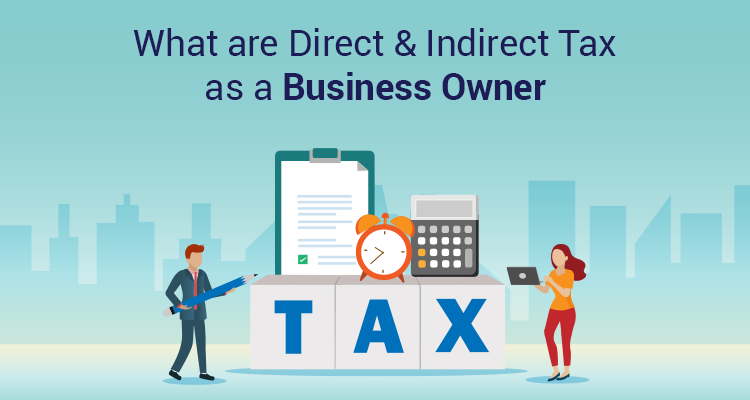What Are Direct & Indirect Tax As A Business Owner

Adhering to rules and regulations is important for all businesses today. Businesses that tend to ignore compliances may find it difficult to sustain in the long run. Usually in any country the government or the authorised statutory body frames laws or guidelines pertaining to safety regulations, industrial management, etc. that every business should comply with. Likewise to improve services and to foster economic growth and development, it is imperative for every business to pay taxes based on their income.
In India taxes are categorized into: Direct and Indirect taxes.
What Is Direct Tax?
It is a tax that is imposed directly on a taxpayer and cannot be passed on to someone else. It is often referred to as Income Tax in businesses. In India, the Central Board of Direct Taxes (CBDT) is responsible for the collection, administration and implementation of direct taxes on behalf of the government.
Direct taxes that are levied on a business include income tax or corporate income tax. For business owners, the income tax is calculated on the annual earnings or revenue generated during a financial year. However, the paid tax is also based on the income tax slabs as set by law.
Most businesses in India need to file an income tax return, based on their annual projections, every year in advance. At the end of the financial year, if the tax liability is lower than the actual paid taxes, they can file for a tax refund. On the contrary, they need to pay the additional amount in case the paid tax amount is lesser than the actual tax liability.
What Is Indirect Tax?
It is a tax levied by the Government of India on purchased goods and services. It is like a sales tax and can be shifted from one taxpayer to another. Prior to 2017, when the Goods and Services Tax (GST) was enacted, there were many indirect taxes which actually resulted in the customer paying much more than the actual price of a product bought or a service acquired.
Earlier, the different types of indirect taxes that were imposed are as follows:
• Service tax: This was charged on any types of services (like eating in a restaurant, booking a hotel, etc.) availed by the customer.
• Excise duty: This was paid by the manufacturers for manufacturing goods.
• Value Added Tax (VAT): This was paid on the value addition in price during the sale of goods. It was added at every stage starting from manufacturing to distribution, and was then passed on to the customer.
• Custom duty: This was paid by consumers and retailers on the goods imported from countries outside India.
• Stamp duty: This was paid on the sale of immovable property, legal documents, etc.
• Entertainment tax: This was levied on every transaction related to entertainment, inclusive of movie tickets, exhibitions, amusement parks, stage shows, etc.
• Sales tax: This was paid by the retailer and then by the customer.
Difference Between Direct Tax And Indirect Tax
While direct taxes are levied on the taxpayer’s income and profits; indirect taxes are charged for the goods and services purchased by the taxpayers. The government directly collects all direct taxes but for indirect taxes there is an intermediary for collecting it from the end-consumer. Unlike indirect taxes where the tax rates are the same for everyone, the rate of direct tax is decided by the government based on profit and income of an entity, be it an individual or a business.
Here it is worth mentioning that direct tax is a progressive tax as the tax rate increases with an individual’s profit and income. On the other hand, indirect tax rate which is independent of an individual's income, can be looked at as a regressive type of tax.
Conclusion
Taxes are a kind of obligatory recurrent fee and are the main source of revenue for the state and central government. Business taxes can be complicated. But both direct and indirect taxes are for the betterment of the country’s economy. So being a responsible citizen of the country, it is good to pay taxes on time.
Now taxpayers can enjoy the privilege of filing their income tax directly from their bank account. It can be done using the authorized bank debit card or through a net banking facility. IIFL Finance allows all its customers to e-file their taxes from the company website. And in case you are looking for a loan, both personal or business, you are knocking on the right door. IIFL Finance offers a wide range of exciting loan products to cater to every need of yours.
Disclaimer : The information in this blog is for general purposes only and may change without notice. It does not constitute legal, tax, or financial advice. Readers should seek professional guidance and make decisions at their own discretion. IIFL Finance is not liable for any reliance on this content. Read more



